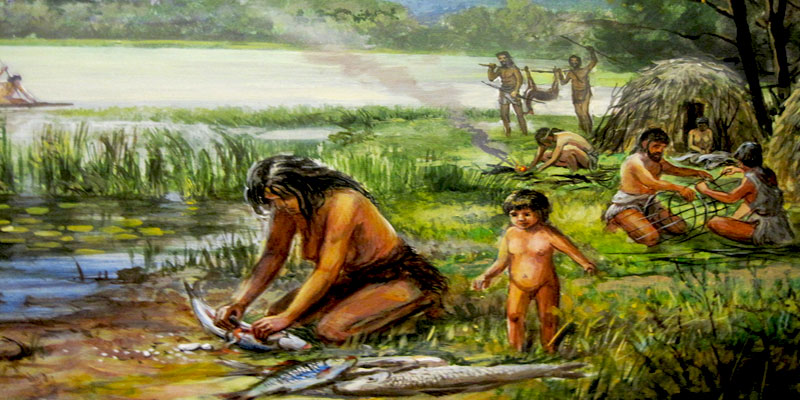Humans are not necessarily violent by nature. New research shows that it was a rare occurrence for our nomadic ancestors to make war.
By Ari Nykvist
We are aggressive and bellicose by nature. Have always been and will always be. Wars are as old as humankind itself and fundamental to it, and warring and mass killing were already common thousands of years ago. Warring, consequently, has deep roots in the history of humankind.
These widespread (mis)understandings are now being questioned by the anthropologist Douglas Fry and the doctoral student Patrik Söderberg at the Department of Developmental Psychology at Åbo Akademi University. In their article on the origins and causes of war, which has been published in the prestigious scientific journal Science, they show that wars are actually a relatively recent phenomenon in the long history of humankind.
In their article, Fry and Söderberg show that among societies lacking agriculture and animal farming, where people still live as nomads and wander around to find food and protection, wars and mass killings are uncommon. The material for the study was taken from the international database SCCS, the Standard Cross Cultural Sample, and in order to avoid bias, criteria for inclusion that had been set by other researchers were used. This resulted in the selection of 21 contemporary nomadic hunter-gatherer cultures around the world and a total of 148 cases of deadly violence.
“When we studied the reasons for deadly violence among these peoples in detail, it turned out that it is actually unusual for people to die as a result of war. In more than half of those cases, there was a victim and a perpetrator and those involved almost always belonged to the same society,” says Fry.
“There were often personal motives, not collective ones, for the murders. Men fighting over the same woman, over infidelity, and theft or revenge of different kinds. More rarely they fought over access to food or drink,” says Söderberg.
War is a relatively recent phenomenon
Out of the 21 different peoples that were studied, twenty were anything but war-mad. However, one group of nomads, the Tiwi people of northern Australia, alone represented nearly half of all deaths and more than three quarters of the deaths between groups. Apart from that, only 15 per cent of the deaths were the result of violence between two different groups. Thus, according to Fry and Söderberg, the Tiwi people is rather the exception that confirms the rule. Are humans, then, peaceful beings and has war, in reality, played a less prominent role in the evolution of humankind than we have so far believed?
“Yes, but we have become somewhat more bellicose over the past 5,000-6,000 years. As settled societies arose which were characterised by agriculture, a variety of resources, large tribes with strong leaders and subsequently different forms of government, war became more common. The more socially complex a society becomes, the more often it seems to make war against other societies,” says Fry.
Consequently, neither Fry nor Söderberg find a direct connection between aggressiveness and war. Aggressive individual behaviour is a different phenomenon compared to war. War is often a strategy, a game and an image of threat that politicians and economic leaders practice in places where war as a phenomenon is often dehumanised. An example of this is is the United States’ use of remote-controlled droners in Afghanistan.
As individuals we are, on the contrary, very flexible; we may live together in many different ways and those who are not aggressive and do not wish to keep clashing horns with others all the time are rewarded. Killing other people is still an exceptional event in human societies, which, for instance, is reflected in the fact that in Finland only four to five murders are committed annually per 100,000 inhabitants. According to Douglas Fry, there is thus a great potential for peace, cooperation and consensus.
“Before, there was both the time and space to simply avoid opponents and enemies. Today more complex and active solutions are needed to avoid war, which has often both political and economic causes. Such solutions may include peacemaking, war courts, and international negotiations,” Söderberg adds.
The present widely-held idea that war is close to unavoidable and a part of our nature, has been strongly affected by what is happening in our own society. Peace being often cynically signified today as a brief period between different wars is, according to Fry, a negative definition of the word peace, which is typical of our times. Peace is about so much more, and it is about a long list of things that are positive and natural and desirable for us humans.
“Social equality, access to food and a roof over one’s head, democracy, human rights, a clean environment, security and safety. The list can be endless when peace is defined in a positive manner. We wish to feel safe and secure. Peace is the starting-point, the obvious one, war is not. We did not find one single case where a group of nomads would have attacked another group just for the sake of war itself or for the fun of it. War is not a part of the personal character of human beings and it is possible to avoid it,” says Fry.


